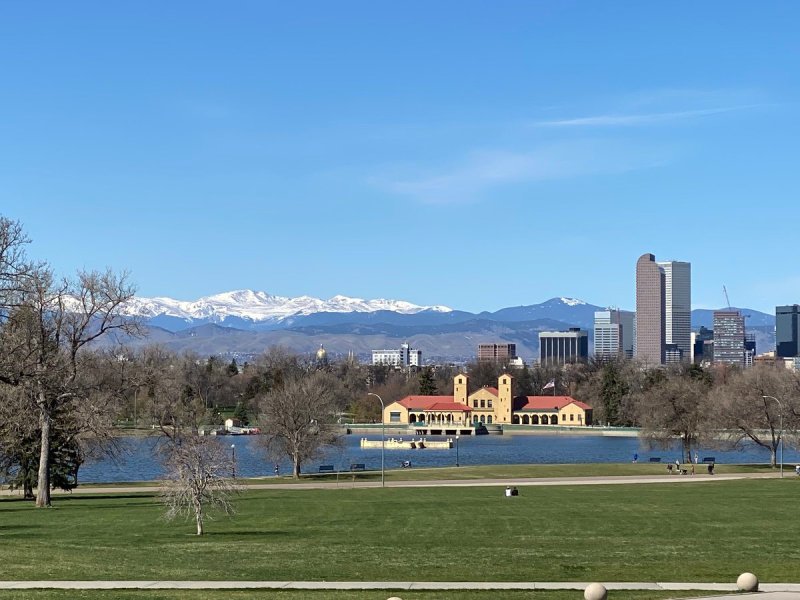Taking a Deep Breath (of reduced VMT)

Molly McKinley is the Grassroots Advocacy Manager for Bicycle Colorado and the Vice Chair of the Denver Streets Partnership. In addition to her advocacy work on mobility, she has a background in environmental advocacy in her home state of North Carolina. When she’s not working for safer streets she’s running in the mountains or riding her bike. Follow her on Twitter @molly_mckinley
Since the stay-at-home order was issued for Denver, I’ve been breathing a lot easier. Not because I’m wildly introverted (the opposite, actually) but because I suffer from asthma. You might have noticed the clear view of the mountains, but I’ve been enjoying the beauty of doing activities I love, like running and biking, without feeling like I’m breathing through a straw.
I moved to Colorado in the summer of 2018, a few years after spending hours in doctors’ offices trying to understand what was causing my shortness of breath. I was excited to move to Colorado for many reasons, but picturesque trail runs and hopes of better breathing in a new environment topped the list.
When you’re moving to Denver, people really advertise the 300 days of sunshine a year but they never mention the 260 days of elevated air pollution levels. The summer of 2018 was dry and wildfires plagued the west. I attributed my shortness of breath to altitude and particulate matter in the air. As the months passed, I acclimated and the wildfires died down, but I continued to experience shortness of breath, particularly on my evening bike commute. It became like clockwork – I’d notice shortness of breath on a bike ride or run, come home, check the air quality, and every time I’d find an elevated level of air pollution. It was a rare day when the air quality level remained in the “good” range.
Over the past month or so that we’ve been on “stay-at-home,” my breathing has been better than it’s been since 2014. It isn’t just anecdotal, either – this is what advocates for the environment, health, and mobility have been telling us for years. Reducing vehicle miles traveled is one of the most important steps to improving air quality. With motor vehicle travel reduced some 60% across the state, I’d wager that air quality along the Front Range hasn’t been this good in decades, if not longer.
The issue of air quality goes far deeper than my own personal experience. Across the country, low income communities and communities of color are disproportionately impacted by air pollution. Denver is no exception. Communities like Valverde, Sun Valley, Northeast Park Hill, Montbello, Globeville, and Elyria Swansea have asthma rates significantly higher than the state average. This a systemic issue that our local and state leaders fail to address every time a highway expansion is approved or another permit is issued for an industrial polluter. It’s an issue that influences how people in those communities are impacted by COVID-19.
Recently, State House District 8 Representative Leslie Herod pointed this out and asked state officials to release racial data on COVID-19-related infections, hospitalizations, and deaths. The Polis administration released that data at a press conference shortly after. Unsurprisingly, it confirms that communities of color are disproportionately impacted by COVID-19, likely due to a number of factors including socioeconomic status and pre-existing health conditions like asthma.
Time and time again I’ve heard the argument that Denver’s air quality could only get “so good” because of its unique geography that traps air pollution on this side of the mountains. That may be true to some degree, but we are experiencing better air quality right now and it’s largely because there are fewer cars on the road. I urge leaders to prioritize human health over car-based convenience and pursue opportunities to maintain this better air quality beyond the current crisis, such as using economic relief funds to make public transportation free and investing in street improvements like sidewalks, dedicated bus lanes, and bike lanes. These investments would not only help get people back to their workplaces once physical distancing is relaxed but they would also create jobs for people in our community who need them. I can’t say how our lives will continue to evolve as we work through this pandemic, but I sure hope on the other side, our leaders have the political will to champion policies that put the health of all communities first, especially now that we can breathe the benefits.
Get Streetsblog Denver’s weekday headlines delivered to your inbox. Sign up for our e-mail digest.
We’re a nonprofit and we rely on the donations of our fans and readers. Give $10, $25 or $50 now.


